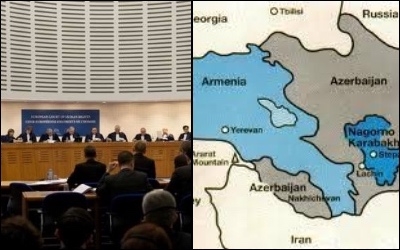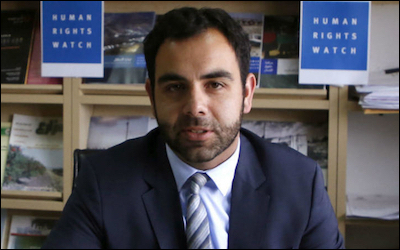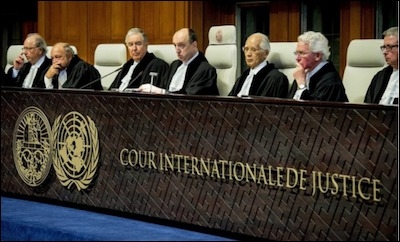by Matthew Mainen
The European Court held that "physical presence of foreign troops is a sine qua non requirement of occupation, i.e. occupation is not conceivable without 'boots on the ground.'
Originally published under the title "Omar Shakir's Lawfare."

In
a landmark 2015 ruling on the Azeri-Armenian conflict, the European
Court of Human Rights said the "physical presence of foreign troops is a
sine qua non requirement of occupation."
|
The next day, in fact, international jurist Marko Milanovic penned a piece titled, "European Court Decides that Israel Is Not Occupying Gaza." Any honest observer would agree. Unfortunately, Human Rights Watch's Israel/Palestine director Omar Shakir did not get the memo, as he still insists Gaza is occupied.
As Shakir faces possible deportation from Israel for his BDS advocacy, his willingness to distort the law in a way unfavorable to Israel suggests an overarching goal of demonizing the Jewish state, not achieving justice.

Human
Rights Watch Israel/Palestine director Omar Shakir insists Gaza is
"occupied" by virtue of Israel's control over its airspace, sea access,
and borders.
|
The European Court held that "physical presence of foreign troops is a sine qua non requirement of occupation, i.e. occupation is not conceivable without 'boots on the ground.' Therefore, forces exercising naval or air control through a naval or air blockade do not suffice." In other words, as there is not a single Israeli soldier in Gaza, the territory cannot be considered occupied.
The ECHR ruling is well grounded in long-standing customary international law.
|
In the 1948 Subsequent Nuremberg Tribunal's Hostages Case, the court held that "an occupation indicates the exercise of governmental authority to the exclusion of the established government. This presupposes the destruction of organised resistance and the establishment of an administration to preserve law and order."

The
U.S. Military Tribunal at Nuremberg held in 1948 that occupation
"indicates the exercise of governmental authority" and "presupposes the
destruction of organised resistance."
|
The criteria for occupation affirmed at Nuremberg was also reflected in the 2005 International Court of Justice case Congo v. Uganda. The court held that an occupation exists when foreign troops are "not only stationed in particular locations but also that they had substituted their own authority for that of the" local government. By Uganda's own admission, it once had thousands of soldiers in Congo. However, the court considered as occupied only an area where a Ugandan general created a province and installed a governor. This is despite the fact that Uganda exhibited considerable control in some other areas through overseeing elections and administering an airport.

In
2005, the International Court of Justice held that an occupation exists
when foreign troops have "substituted their own authority" for that of
local government.
|
Aside from the longevity and abundance of the case law, numerous military field manuals, a gold standard for assessing customary international law, support the position that Israel does not occupy Gaza. These include the chapters on occupation in the American, Canadian, and British manuals.
In Shakir's defense, some might point to other important actors in international law who share his view. In 2014, the International Criminal Court's Office of the Prosecutor held that "there is a reasonable basis upon which to conclude that Israel continues to be an occupying power in Gaza despite the 2005 disengagement." This basis centered on much of the evidence Shakir utilized, which in turn has little foundation in international law as understood for the past 70 years.
One can morally object to Israel's handling of Gaza without mischaracterizing the law.
|
You can morally object to Israel's handling of Gaza without mischaracterizing the law. Instead, Shakir's concerning use of a thoroughly debunked legal framework serves only to label the Jewish state as a dreaded "occupier." This marginalizing language, whether he recognizes it or not, serves a greater purpose: to delegitimize Israel. Given his clear support of BDS and less than honest handling of the legal situation, Israel can do without him.
Matthew Mainen is a Washington-resident fellow at the Middle East Forum and graduate of Stanford Law School. Follow him on Twitter.
Source: https://www.meforum.org/59531/is-gaza-occupied
Follow Middle East and Terrorism on Twitter
No comments:
Post a Comment